-
Has a free plan that finds your data on broker sites
-
Removals Report comes with screenshots to prove progress
-
AES-256 encryption isn't always used
Advertiser Disclosure
All About Cookies is an independent, advertising-supported website. Some of the offers that appear on this site are from third-party advertisers from which All About Cookies receives compensation. This compensation may impact how and where products appear on this site (including, for example, the order in which they appear).
All About Cookies does not include all financial or credit offers that might be available to consumers nor do we include all companies or all available products. Information is accurate as of the publishing date and has not been provided or endorsed by the advertiser.
Editorial Policy
The All About Cookies editorial team strives to provide accurate, in-depth information and reviews to help you, our reader, make online privacy decisions with confidence. Here's what you can expect from us:
- All About Cookies makes money when you click the links on our site to some of the products and offers that we mention. These partnerships do not influence our opinions or recommendations. Read more about how we make money.
- Partners are not able to review or request changes to our content except for compliance reasons.
- We aim to make sure everything on our site is up-to-date and accurate as of the publishing date, but we cannot guarantee we haven't missed something. It's your responsibility to double-check all information before making any decision. If you spot something that looks wrong, please let us know.
Sometimes it can be fun to enter your name in a search engine to see what pops up in the results. But you might be surprised to find several websites that have built an extensive profile on you, including your home address, phone number, and a list of your relatives.
While this can feel intrusive, one of the easiest ways to remove your information from the internet is to use an information removal tool like Optery. Optery can find your information on data-broker sites, also known as people-search sites, and then request it to be deleted on your behalf.
Optery offers a free plan, but its paid plans are also desirable for people looking for reassurance that their personal data is deleted from the internet and out of reach from identity thieves.
What data does Optery protect?
Does Optery keep your data safe?
Optery customer support
Optery prices and subscriptions
Optery FAQs
Bottom line: Is Optery good?
Optery review at a glance
| Price | $3.99–$24.99/mo (for paid plans) |
| Free trial | Yes — ongoing monitoring |
| Data broker opt-out | Yes |
| Marketing list removal | Yes |
| Privacy reports | Yes |
With Optery you can get a free account, which can help you find data broker sites containing your private information. The search takes about an hour to complete, and then you can use its helpful opt-out guides to remove your data.
You can also automate your opt-out requests by upgrading to a paid subscription. Optery will begin the process of removing your information from data broker sites and then send a Removals Report, which includes before and after screenshots to prove your data has been deleted.
Optery is easy to use and has a clean interface. Although it can be a bit more expensive than its competitors, you may find the extensive Removals Report a good value in exchange.
Optery pros and cons
- Has a free plan that finds your data on broker sites
- Removals Report comes with screenshots to prove progress
- Easy to sign up and use
- Customer support was slow
- AES-256 encryption isn't always used
What data does Optery protect?
Optery offers services to help you remove your personal information from the internet. Some of the data it can help delete includes:
- Name
- Birthday
- Current and past addresses
- Alternate names
- Phone number
- Names of relatives
Our experience with Optery
Overall, we found Optery easy to begin and continue using. The sign-up process was smooth, and the dashboard made it simple to follow what was happening with our information on people-search sites. But there were some flaws with customer support and data security.
Getting started
When you sign up for Optery, it asks for your personal information to help identify your data on websites. We were asked for our name, email address, birth year, city, and U.S. state. It was optional to include my middle name and exact birthdate.
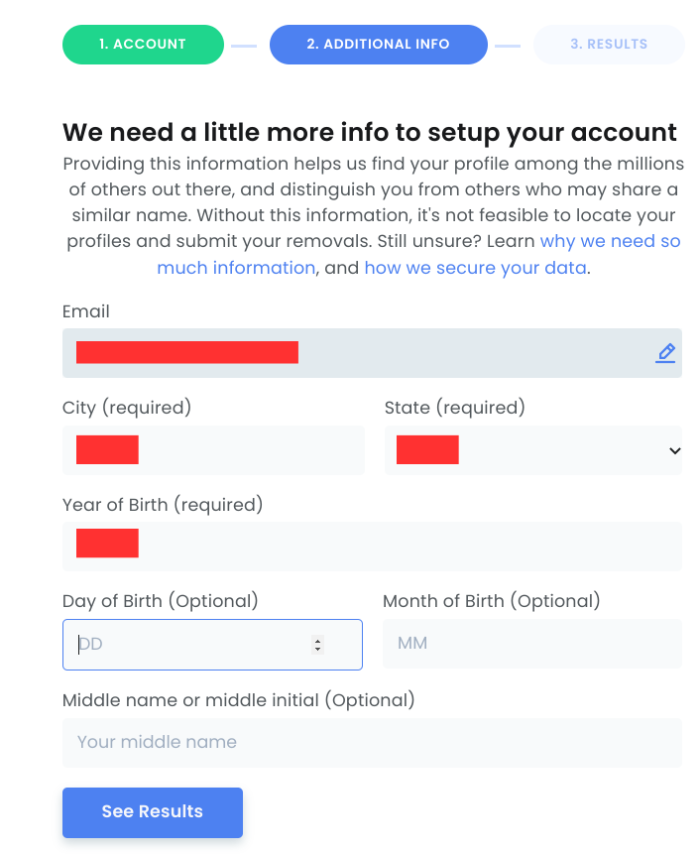
Now hang on. Sharing your private info with a website? Isn't that the opposite of what you're trying to accomplish? Well, the short story is that Optery needs this information to find and remove it from other sites. Without it, the opt-out software wouldn’t be able to find you.
Dashboard and reports
The main dashboard is easy to use and navigate. The latest Exposure Report is clearly displayed, including screenshots of websites with your personal information. The paid plan also includes a Removals Report to show from which sites Optery has successfully managed to remove your information.
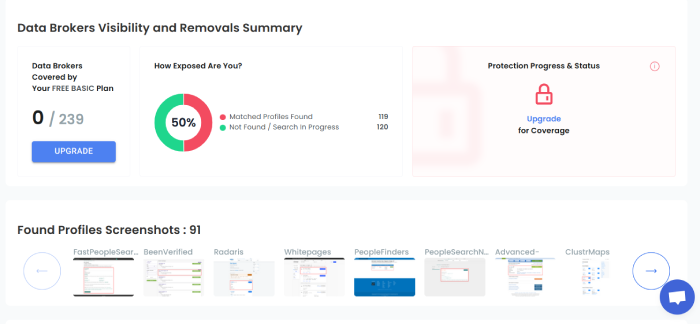
And then it shows a list of data broker websites linked to your suspected profile.
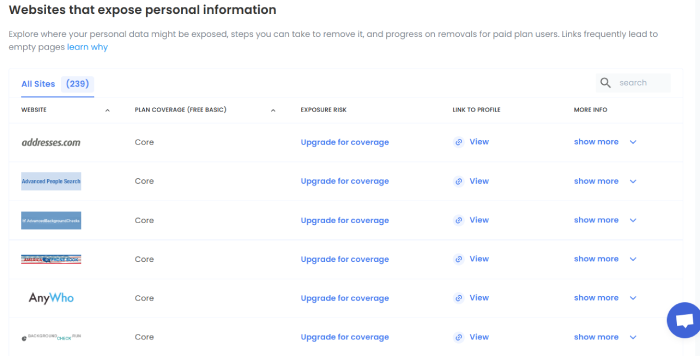
So how often can you expect a report from Optery? The free plan only has the Exposure Report, which is delivered every 90 days. Meanwhile, the paid plans will share an Exposure Report at least once every 30 days. You could get one more often, especially if you are new and have a lot of information online. Paid plans also include a Removals Report, which is sent every three months.
You can see these reports within the dashboard, but Optery can also email you to let you know when your reports are ready.
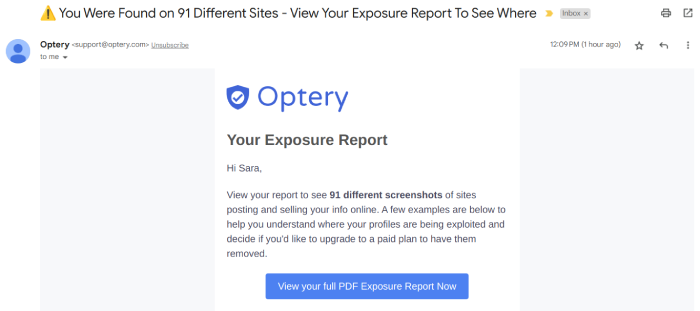
We received our Exposure Report a little over an hour after signing up for Optery. It told me how many data brokers were scanned and how many profiles it was able to match with our information. The 50-page report also included screenshots of data broker websites with the matched profile information.
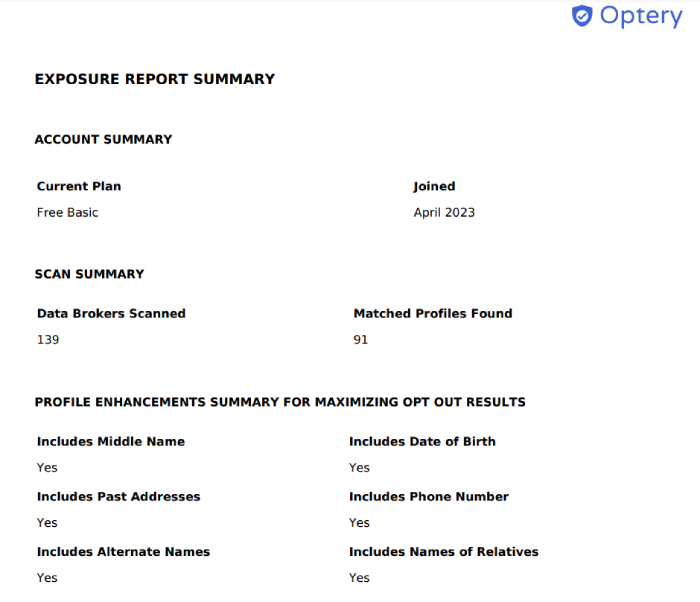
While the report was useful, it was also a bit overwhelming. Since the free plan doesn't include any data removal services, you had to do those tasks manually. Optery does have several guides on how to opt out of these websites, but who has the time to remove their data from over 100 websites? At this point, it seemed easier to upgrade to Optery's data removal services.
Additional features
Optery has a few additional features included in its paid plans:
- Allows you to automatically opt out of new data broker sites
- Ability to request having your data removed from sites not listed on Optery
- Receive a Removals Report that shows how Optery is removing your profiles from data broker sites
How do you know if Optery works?
For paid users, Optery provides a Removals Report. It contains a "before" screenshot showing the data on a broker site and then an "after" screenshot when the data is removed. This is sent every three months, so you can have peace of mind that Optery is working.
In between reports, you may want to consider manually checking data broker sites to see if your data is still there. For example, you could look to see if your data is removed from WhitePages listings or deleted from LexisNexis.
Does Optery keep your data safe?
As always, before sharing your data, you should consider the organization's privacy policy and how it plans to protect your data. According to Optery, it doesn't sell your information to third-party vendors. It also enacts several security measures like access control (ensuring employees receive only minimal access to data to complete their jobs), employee and contractor confidentiality agreements, and multi-factor authentication with authenticator apps.
The company's privacy policy contains a "plain language" section before it dives into the full legal document. This makes it easy to identify key points.
Optery’s only real red flag is its encryption. Data at rest is securely protected by AES-256 encryption, which is an industry-standard protocol. However, when data is in transit (moving from one location to another) it has only TLS encryption. It's not the highest encryption standard, so it's not an ideal choice.
Optery customer support
Optery has a live chat, guides on how to remove your information from data broker sites, and a help desk for FAQs. The guides and help desk were easy to read and were pretty useful in learning how to use Optery and how to opt out of data broker sites.
The live chat leaves a lot to be desired, though. Initially, a chatbot was helping us but it was clear that it didn't know the answer to our question, so it moved us over to a customer service representative. We received a notification that it could take anywhere from one to three days to receive a response. That's a pretty long time to wait for an answer.
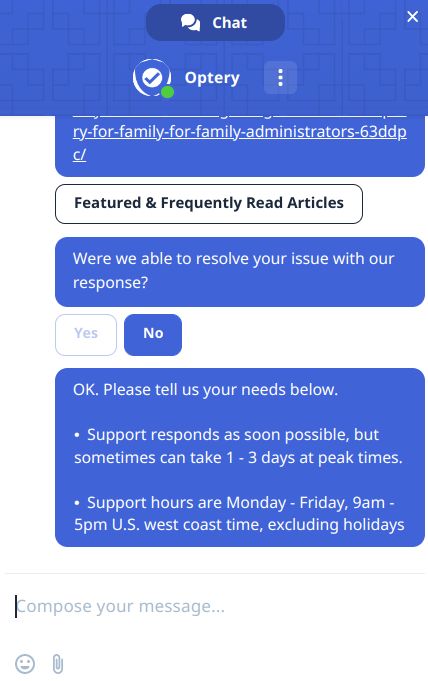
Luckily, we got a response two hours later but we didn't notice it until the next day when we logged back in to Optery. We didn't receive an email notification that we had received a customer support response, so the experience felt like it dragged on more than it should have. On the bright side, the customer support representative gave a lot of helpful information in their reply.
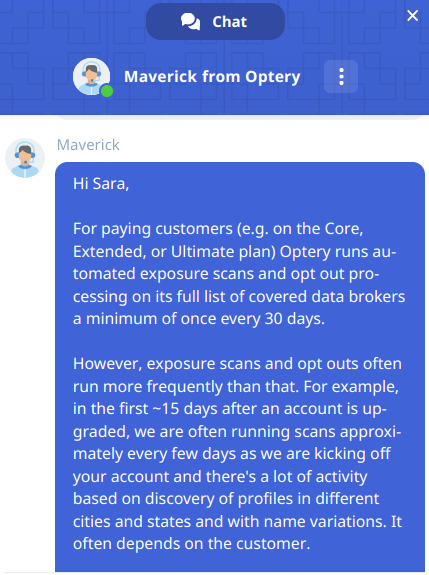
Optery prices and subscriptions
Optery is unique from other data removal services because it offers a free plan. While this doesn't include any removal services, it is helpful for people who are willing to opt out of these sites on their own.
When it comes to paid subscriptions, Optery leans toward the expensive side. Plans are based on the number of data broker sites Optery will remove data from on your behalf. Optery Core will remove from over 95 sites, Extended will remove from over 150 sites, and Ultimate will remove from over 235 sites. This is a different approach from competitors like Incogni and DeleteMe, which include all available sites with their paid plans.
Incogni removes data from over 180 data broker sites, and DeleteMe does it for over 750 sites. The most comparable Optery plan is the Extended subscription, which can remove data from over 150 sites. Incogni costs $77.88 annually, DeleteMe is $129 annually, and Optery Extended is $149 annually.
Optery has another downside: there are no family plans, so your family members must create their own accounts. Instead, you can link individual accounts together for a discount.
So why pay more for Optery? What's unique about Optery is that it includes screenshots in its Exposure and Removals Report. This way you can confirm that the company is accomplishing the goal of removing your data from the internet. If this isn't important to you, then you may prefer a different alternative.
Optery plans comparison
| Plan | Optery Free Basic | Optery Core | Optery Extended | Optery Ultimate |
| Price per month | Free | $3.99/mo | $14.99/mo | $24.99/mo |
| Price per year | Free | $99.00/yr | $149.00/yr | $249.00/yr |
| Money-back guarantee | N/A | Yes — 30 days | Yes — 30 days | Yes — 30 days |
| Data broker opt-out | No | Yes — 95+ sites | Yes — 150+ sites | Yes — 235+ sites |
| Privacy reports | Yes — Every 90 days | Yes — At least once every 30 days | Yes — At least once every 30 days | Yes — At least once every 30 days |
| Unlimited name variations | ||||
| Unlimited past cities and states | ||||
| Custom removal requests | ||||
| Priority customer support | ||||
| Details | View Optery Plans | View Optery Plans | View Optery Plans | View Optery Plans |
Optery FAQs
Is Optery worth it?
Optery can be worth it if you are looking for a data removal service that proves it's removing your data from broker sites. Optery provides Removals Reports every three months, which include before and after screenshots. While competitors send similar reports, they often don't include screenshots as evidence that the service is working.
How does Optery work?
Optery works by creating an Exposure Report, which matches your information with profiles on data broker sites. At this point, you can request to delete your data on these sites yourself or upgrade to a paid subscription, so that Optery can do it on your behalf. If you choose the latter option, Optery will send a Removals Report to update you on the progress of deleting your information on data broker sites.
Is there a list of data brokers that Optery removes?
There is a list of data brokers that Optery removes. Depending on your subscription, Optery can remove your data from over 235 sites. You can find a full list of these sites on Optery’s pricing page. The list is organized by plan, so you can see which sites are covered under which subscription.
Is Optery selling my data?
Optery doesn't sell your data. According to its privacy policy, Optery doesn't sell or rent your data to any third parties. It also claims to not have any affiliation with data brokers. While Optery does use your information for marketing purposes, it doesn't sell your data to third parties.
Bottom line: Is Optery good?
Optery has a free plan that can help people find their personal information on data broker sites. This is a great benefit that we couldn't find with the other competitors. If you do decide to use the paid subscription, you can receive the Removals Report, which includes before and after screenshots of the Optery data removal service.
However, there are some drawbacks to using Optery. It's more expensive compared to its competitors, so it may not be the best option for budget-conscious people. While it does use AES-256-bit encryption for data in storage, it uses TLS encryption for data in transit. TLS encryption isn't the strongest choice, so it does raise a red flag on the security of your data. Finally, our customer support experience was a bit slow.
Overall, Optery may be a good choice for people who want to utilize the free plan to find their information on data broker sites and then opt out on their own. Optery can also help you prevent anything from spam calls to identity theft. The paid plans, with their extensive Removals Report, may also be a good choice for people who want evidence that Optery is deleting their data.
-
Has a free plan that finds your data on broker sites
-
Removals Report comes with screenshots to prove progress
-
AES-256 encryption isn't always used






